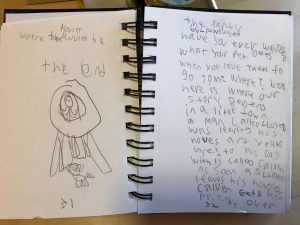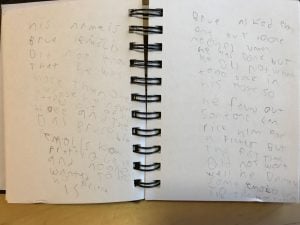My son has been on my mind a lot, as he is most days. I have written about him before (https://historycomics.edublogs.org/2017/04/09/a-human-humanities-course/) and the obstacles that he has to overcome in life and school. We have been in large IEP meetings with his speech therapist, occupational therapist, and other specialists. He has a rare form of Meningitis that causes him a lot of migraines, aches, fatigue, and hospitalization. I’ll spare you all the details, but his condition is a central piece of this post and has helped me to be a better teacher and human being. I can often see the pain and fatigue in his eyes, but he powers through and inspires me everyday. It is important to note that we LOVE the school district our kids are in and we have been blessed to have amazing teachers for all three of our children. This post is not a complaint about them in any way, but we did have a bad experience in a private school (we pulled our kids out as a result), and I am also reflecting on what I hear other parents and teachers say throughout my life. This is also not a complaint about private schools either – just the one where my children were previously enrolled.
My son has fine motor skill issues with his hands and his handwriting is often hard to decipher as a result. His hands will hurt when he writes for too long and the upcoming state tests always have us on edge. When he took the exams last year, he came home from school, ate an early dinner, then went directly to bed and slept for 14 hours as a result of his fatigue. It has been suggested that he sit out the exams, but we also know that he can’t be excused from too much in life, that we need to find ways to adapt. We also know, as educators, that if he does not take the exam, that it will count as an automatic failure against his teacher and school district. This is just one of the criteria that teachers are often judged upon, even though they have little control over it. His team at school (and it is a TEAM!) have put together a game plan with a scribe and to keep us in the loop as to his fatigue levels during the tests. He will also have someone bubble in the bubbles on the answer sheet as this task is all but impossible for him. Enough on my standardized testing rant, I could write a book on this topic alone.
All of this is to get to my central point for this post – his handwriting. We often cannot read his writing, and, especially frustrating, is that he often cannot read his own writing. He LOVES to write stories and to illustrate them with amazing original art (I credit the many shelves of comics, graphic novels, and traditional books in our home). He keeps a little black book to write in as inspiration finds him and he will often read these wonderful stories to family members. We need to have a little patience as he sometimes has to figure out a word or two that he cannot read, but it is so worth the wait. He had a teacher, in his former school, that would often comment on his “messy” writing and that he needed to put forth more effort. He also had an art teacher who would comment on his “messy” drawings that needed more detail, or cuts with scissors that were not straight enough. He was already termed a “reluctant reader” at school. Add up all this and you had a kid who was being unfairly judged and whose confidence was shattered. He began to rebel at school and to withdraw from the lessons being given. We also saw this rebelliousness at home and were trying to figure out how best to help him. It was comic books that gave my son the confidence and engagement he needed to become the amazing reader, writer, and illustrator he is today. It was also enrolling him in his current public school district where his amazing teachers also helped him to find his confidence.
My blood boils as I write this, but I am so happy that he is in a better place. However, his writing will always be a struggle. I have had parents joke around about their own child’s writing and make a comment about messy handwriting and to even seem embarrassed about it. Kids hear these comments and internalize them. IT is too easy to judge at first glance. This often happens when I pull out their writing folder and share their child’s work with them. I ask them to look beyond the handwriting, and like my son, look at the content of their words. This is when the conversation becomes uplifting and empowering. Messy handwriting is often not a sign of being lazy or unmotivated – for many, it is just too difficult a task. We need to actually read what our kids are writing and give them specific feedback and encouragement.
After over 15 years as an educator, I have learned perhaps the most important skill – the ability to laugh at myself and to forgive mistakes. I used to be a strict A-type teacher – the one who needed perfect handwriting, to have the torn edges taken off of loose-leaf, to discuss with parents how their child needed to do less doodling on their notes and actually pay attention, etc – groan! I now understand the brilliance being shown in the “doodling” shown on papers and I now encourage sketch-noting and making these important neural connections. (It’s also why I refer pen to paper rather than computer writing – but that’s another post). It is because of my own children’s experiences with ADHD, my experiences with comics, and our Art Department Chair that I was able to open my mind. Years ago, I was sitting in an IEP meeting and the Art Chair spoke up about the doodles I was complaining about. He was (and still is) a teacher for whom I have profound respect and his words hit me hard. He spoke to the creative genius and the imagination and connections being made on the student’s papers. I did not become defensive, but began to research and to see the light. Again, it is also my love of comics that helped me with this journey. I know that much research shows that students with ADD/ADHD can benefit from doodling with a purpose (sketch-noting) and taking notes in class. We do not excuse our children from taking notes and have found this expectation to be helpful (for us). I am also a fan of purposeful homework, despite my son’s physical issues and the ADHD in all of my children. But, again, a topic for another post.
Keep a writing folder for your kids and show parents the power of their words. I know that my son will continue to be shy about sharing his written work, but we continue to encourage him and are so happy that his teachers are able to look past his disability and see the amazingly curious, intelligent, and creative boy behind the “messy” words. Be conscious of the comments you make to students and the confidence you may be undermining. Also be aware that this confidence may have been shaken in years before you. Embrace creativity – no matter how “messy.”



